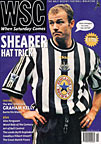 Newcastle have sacked another manager, leaving us wondering whose fault this mess is
Newcastle have sacked another manager, leaving us wondering whose fault this mess is
Another August, another Newcastle manager on his way. This time last year we boldly hinted at disaster for clubs like United who change their manager with ever increasing frequency. Obviously, it gives us absolutely no pleas-ure to have been proved right. No, really, not even a tiny bit.
“I want to be judged on my ability as a coach, not on the other things,” Ruud Gullit pleaded. OK, here goes: he was rubbish. So spectacularly inept, in fact, that he virtually sacked himself. That much was different from Kenny Dalglish’s grim but possibly redeemable reign. What hasn’t changed is that his successor will be landed with a vast, disparate and very costly squad of players, most of whom he would probably rather exchange for his own motley collection.
Over 40 players made league appearances for Newcastle in the Gullit “era”. The turnover has become so large it seems safest to assume that players not in the team have moved on unless there is direct evidence to the contrary. Only occasionally, as in the case of Alessandro Pistone, do they turn out to be still drawing a wage. In the unlikely event of Pistone making the starting line-up again, he would be about United’s fourth longest serving player. That, more than the particular qualities of Kenny Dalglish or Ruud Gullit, is surely at the root of Newcastle’s hapless performances on the field.
But it must surely also have an effect on the relationship between the fans and the club. Much has been made of Gullit’s lack of commitment to the town, and obviously commuting from Amsterdam is not great PR, regardless of what it does for the team. Yet even Gullit’s strange ideas about man management might not have seemed so destructive if the personnel of the squad had not been so bewilderingly fluid. The fans’ welcome for Robert Lee after Gullit had left surely owed as much to the fact that he was a familiar face as it did to his likely impact on the field.
Alan Shearer, too, has been valued higher than his performances might justify, because of his symbolic value to the club. It’s not just that he’s a local and a big No 9. It’s also that he’s been around for as long as three years.
Like so much else in football history, the tendency of players to stay longer at one club in “the old days” (itself a conveniently imprecise period) is grotesquely romanticised. Until the end of the maximum wage and the retain-and-transfer system in the early Sixties, players stayed put because clubs could make them. And when the £20 maximum you could make at Preston was the same as the £20 at Manchester United, what was the point of moving anyway?
Until Bosman, moving clubs was still often more trouble than it was worth. In the idealised world of football past, it was “loyalty” that bound players to their clubs, but in truth it was a loyalty that was secured in advance by the legal restrictions clubs had over their players. They weren’t called loyal “servants” for nothing. Players have clearly benefited from overturning that relationship. But what about fans? Many still exhibit the unrealistic expectation that players will love their club as though they were lifelong supporters, when it is plain they have only been lured there by a huge pay packet.
Almost as a response to this, we now see players – usually new signings or those reported to be in dispute with their clubs – making a point of rushing towards their team’s fans and kissing the badge when they score, an empty gesture, but one that always seems to be ecstatically received. The only way supporters could hope to see their devotion to their club mirrored by the players representing them on the pitch would be in a fantasy world (such as that conjured up by Sir John Hall) where the team consists entirely of locally born products of the club’s youth system. (And, incidentally, it’s even harder to get anywhere near that ideal when one of your managers comes up with the bright idea of abolishing the reserve team.)
At the time of writing Bobby Robson is the papers’ choice as the next Newcastle manager. For all the “black and white blood” he claims is coursing through his veins, he will not be able to square the fans’ longing for a more recognisable team with the strictures of the Bosman ruling unless he can himself command some loyalty from those under him.
One or two can do it. Alex Ferguson, obviously. Martin O’Neill too, and Graham Taylor. But they in turn have one advantage that Newcastle managers traditionally don’t have – the reciprocal loyalty of those above them. See you next year.
From WSC 152 October 1999. What was happening this month